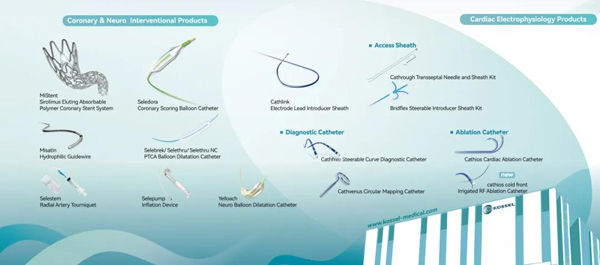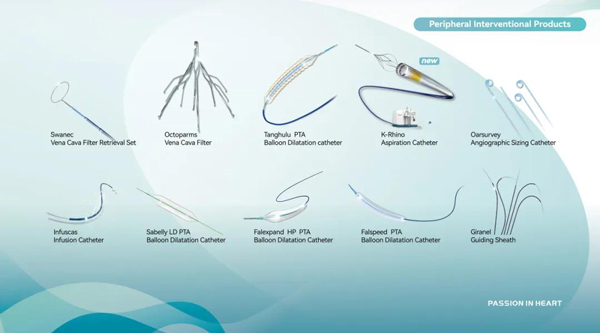Purpose-built for peripheral thrombus aspiration
Category: Kossel
-
Vena Cava Filter Procedure (Series)
How to address the issue that the angle between the inferior vena cava and the left iliac vein is large and there is a risk of tilting during the filter release?
-

Vena Cava Filter Procedure (Series)
How to address the issue that the angle between the inferior vena cava and the left iliac vein is large and there is a risk of tilting during the filter release?
-
Octoparms® Vena Cava Filter Procedure(Series)
Techniques For Femoral Access!
-
Reference Document | Expert Consensus on Ultrasound Interventional Therapy for Hemodialysis Vascular Access in China (2024 Edition)
Abstract
This consensus aims to provide clinical physicians with standardized guidance for ultrasound-guided PTA procedures, offer a reference for healthcare administrators in conducting quality control, and promote the wide application and popularization of ultrasound technology in arteriovenous dialysis access.
Preoperative ultrasound assessment
Sequence for ultrasound assessment of autologous AVF
In the direction of blood flow along the internal fistula, successively evaluate the conditions of the inflow tract artery, the anastomosis site, the fistula vein all the way to the point where it joins the brachiocephalic vein to enter the subclavian vein or where the great saphenous vein joins the axillary vein.AVG ultrasonic assessment sequence
In the direction of blood flow along the internal fistula, successively evaluate the conditions of the inflow tract artery, the arterial anastomosis, the entire segment of the graft, the venous anastomosis, the autologous outflow tract vein up to the point where it joins the brachiocephalic vein to enter the subclavian vein, or where the great saphenous vein joins the axillary vein throughout the entire vascular pathway.Evaluation content
Blood flow volume, resistance index (RI), vascular morphology and structure (including vessel diameter, intima-media thickness, calcification status, vascular course and depth), stenosis location (including vessel diameter, length and peak systolic velocity ratio (PSVR), thrombus condition (including location, nature and amount of thrombus)Ultrasound manifestations and assessment indicators of vascular stenosis
1.Blood flow: Under the condition of stable systemic hemodynamics, the natural blood flow of the autologous arteriovenous fistula (AVF) is less than 500 ml/min, and the natural blood flow of the arteriovenous graft (AVG) is less than 600 ml/min.
2.Vascular inner diameter: For veins, the inner diameter of local blood vessels ≤ 1.7 mm or the inner diameter of long segments of blood vessels ≤ 2.0 mm, with a length ≥ 20 mm; for arteries, the inner diameter ≤ 2.0 mm; for veins, if the inner diameter is between 1.8 and 2.0 mm or for arteries, if the inner diameter is between 2.0 and 2.5 mm, a comprehensive judgment needs to be made based on the patient’s clinical symptoms, abnormal signs, and the effectiveness of hemodialysis.
3.RI:RI>0.5;
4.PSVR:PSVR>4。Indications and periods for PTA intervention
Indications for intervention
If the ultrasound assessment reveals that there is one or more areas of stenosis, occlusion or thrombosis in the autologous AVF or AVG, and the patient presents with any of the following one or more symptoms, it is recommended to consider performing PTA intervention.
1.Physical examination findings: The tremor of the internal fistula has significantly weakened or disappeared, while the pulsation has become more pronounced; abnormal results were observed in the arm elevation test and the pulsation enhancement test.
2.Abnormal blood flow: The pump-controlled blood flow during dialysis remained consistently below 200 ml/min.
3.Significant increase in venous pressure: Venous pressure ≥ 200 mmHg, or dynamic venous pressure during dialysis continuously ≥ 160 mmHg
4.Dialysis recirculation rate: Recirculation rate ≥ 15%
5.Decrease in dialysis adequacy: The index of attack adequacy (Kt/V) has decreased without a clear cause by more than 0.2
6.Extended bleeding time: After the dialysis treatment, the time required for stopping bleeding at the puncture site significantly increased (more than 20 minutes), and the influence of coagulation function and anticoagulants was excluded.
7.Increased difficulty in puncture: The puncture operation becomes more challenging due to poor venous filling.Intervention timing
For those meeting the PTA criteria, they should be managed through the specific time surgery. Under the condition that the patient’s vital signs are stable and there are no surgical contraindications, the PTA surgery should be completed within one dialysis period.PTA surgical procedure
Anesthesia method
It is recommended to use ultrasound-guided brachial plexus nerve block anesthesia.Access selection
The fistula vein approach and the distal arterial approach are the most commonly used approaches for performing PTA surgery on AVF.
The artificial vascular approach and the autologous vein approach are the most commonly used approaches for performing PTA surgery via the AVG.Surgical procedure
a. Ultrasound-guided puncture
b. Heparinization is carried out based on the patient’s condition.
c. Utilizing the ultrasound probe from multiple angles to understand the details of the lesion, display the shape of the lesion opening and the channel, and assist in the passage of the guide wire.
d. Balloon Dilatation
Non-compliant high-pressure balloons are the preferred choice for PTA surgery of arteriovenous dialysis access; for stubbornly narrow lesions, ultra-high-pressure balloons or cutting balloons can be selected. Special balloons can be chosen based on the access route to facilitate insertion.
The diameter of the balloon should be 1 to 2 mm larger than the inner diameter of the adjacent normal blood vessel; if the difference in inner diameters between the stenotic segment and the adjacent normal vessel is large or there is a thrombotic lesion, it can be gradually expanded; the length of the balloon should not exceed the length of the lesion by too much to avoid damaging the normal vessel.
For multi-site lesions, the dilation sequence in the reverse blood flow direction can be adopted, with priority given to relieving the stenosis of the outflow tract. The duration of a single balloon dilation is generally controlled within 30 to 60 seconds.
e.Postoperative hemostasis: compression hemostasis, purse-string suture, 8-shaped suture
f.Postoperative puncture care planning was carried out, and postoperative precautions were informed.Standard for successful surgery
Technical success criteria
Self-vascularized arteriovenous fistula (AVF) blood flow ≥ 500 ml/min, AVG blood flow ≥ 600 ml/min; RI < 0.5; Residual stenosis rate at the lesion site < 30%, PSVR < 2Clinical success criteria
The internal fistula tremor can be palpated and has recovered or significantly intensified; the dialysis was successful for two consecutive times after the operation, and the pump-controlled blood flow was ≥ 200 ml/minComplication identification
Hematoma at the puncture site
Vascular spasm
Vascular dissection
Vascular rupture
Pseudoaneurysm
Acute thrombosis formation
Balloon rupture
Fracture of the guidewire and catheter
Thrombosis treatment of dialysis access
Drug thrombolysis, mechanical thrombectomy through aspiration, and open surgical thrombectomy methods
The application of ultrasound technology in other surgical procedures
If the retraction after balloon dilation exceeds 50%, if the stenosis recurs twice consecutively within a short period of time, if there is a severe dissection or pseudoaneurysm during the operation, etc., stent implantation can be considered, and covered stents are recommended. The clinical data of stent implantation under ultrasound guidance are not yet sufficient, so when choosing ultrasound as the guiding method, caution should be exercised.
Ultrasound-guided balloon-assisted maturation technique (BAM) is the first-line treatment for immature arteriovenous fistulas. When choosing the balloon size, caution should be exercised. In case of necessity, gradual dilation can be performed, and contingency plans for vascular rupture should be formulated.
PTA should be the initial treatment for cephalic arch stenosis (CAS). This procedure can be performed under the guidance of DSA or ultrasound. However, stent implantation for CAS is not recommended to be done under ultrasound guidance.
For high-flow arteriovenous fistulas that cause dialysis access-related extremity ischemia syndrome or high-output heart failure, it is recommended to perform ultrasound-guided arteriovenous dialysis access flow-limiting surgery to reduce the blood flow in the fistula.



































